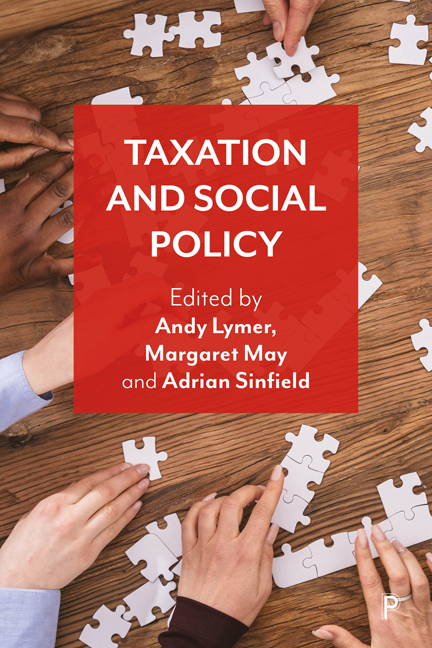Book contents
- Frontmatter
- Contents
- List of figures and tables
- List of abbreviations
- Notes on contributors
- Acknowledgements
- 1 Introduction: The case for considering taxation and social policy togethe
- 2 Fiscal and social policy: two sides of the same coin
- 3 Tax and the social policy landscape
- 4 Fiscal welfare and tax expenditures
- 5 Employment, self-employment and taxation
- 6 Pensions and taxation
- 7 Tax, benefits and household income
- 8 Taxation, health and social care
- 9 Homes, housing and taxation
- 10 Wealth taxation: the case for reform
- 11 Gender and taxation
- 12 Taxation and local taxes
- 13 Corporate tax and corporate welfare
- 14 The climate crisis and taxation
- 15 Conclusions: Taxation in a social policy context
- Index
4 - Fiscal welfare and tax expenditures
Published online by Cambridge University Press: 20 January 2024
- Frontmatter
- Contents
- List of figures and tables
- List of abbreviations
- Notes on contributors
- Acknowledgements
- 1 Introduction: The case for considering taxation and social policy togethe
- 2 Fiscal and social policy: two sides of the same coin
- 3 Tax and the social policy landscape
- 4 Fiscal welfare and tax expenditures
- 5 Employment, self-employment and taxation
- 6 Pensions and taxation
- 7 Tax, benefits and household income
- 8 Taxation, health and social care
- 9 Homes, housing and taxation
- 10 Wealth taxation: the case for reform
- 11 Gender and taxation
- 12 Taxation and local taxes
- 13 Corporate tax and corporate welfare
- 14 The climate crisis and taxation
- 15 Conclusions: Taxation in a social policy context
- Index
Summary
Fiscal welfare and tax expenditures are means of running public policies through tax reliefs. They have been identified as policy instruments by some countries and international bodies for more than half a century. They ‘are alternative policy means by which governments deliver financial support to individuals and companies’ (IMF, 2019, p 7). While such explicit descriptions are now being used more often, the impact of tax reliefs on individuals, the economy and broader society is still much neglected, left hidden, if not secret, in comparison to that of direct public spending.
After introducing the concepts and their development, the chapter considers the particular HMRC classification of UK tax reliefs, the scale of UK tax expenditures and the growing available evidence on them. It discusses their distributive and behavioural effects, their political implications and the impact on the wider distribution of resources across society and the economy. Possible policies to promote greater transparency, accountability, equality and fairness are discussed before the conclusion.
The growing recognition of fiscal welfare and tax expenditures
The two terms, fiscal welfare and tax expenditure, are not identical but overlap. Fiscal welfare, a term introduced by Richard Titmuss in 1955 in the UK, is one of three elements in his social division of welfare (Titmuss, 1955 in 1958; Alcock et al, 2001, part 2, chapter 2). Resources are made available by government through tax reliefs and related subsidies and not only as benefits and services of public or social welfare through the welfare state. The final element is occupational welfare, with services accessible through employment, often subsidised by fiscal welfare. In the UK, this usually means provided or organised through employers but in other countries often by trade unions and other groups (Sinfield, 1978).
The term tax expenditure was first used in the United States in 1967 by Stanley Surrey, an academic tax lawyer working in the federal government, to mirror the term public expenditure to show spending policies being run through the tax system (developed in Surrey, 1973). Established as departures from the tax benchmark, the basic structure of the fiscal system, tax expenditures then ‘represented about a quarter of the Federal Budget’ but were ‘outside the normal procedures of budgetary scrutiny’ (Pond, 1980, p 51).
- Type
- Chapter
- Information
- Taxation and Social Policy , pp. 46 - 66Publisher: Bristol University PressPrint publication year: 2023



